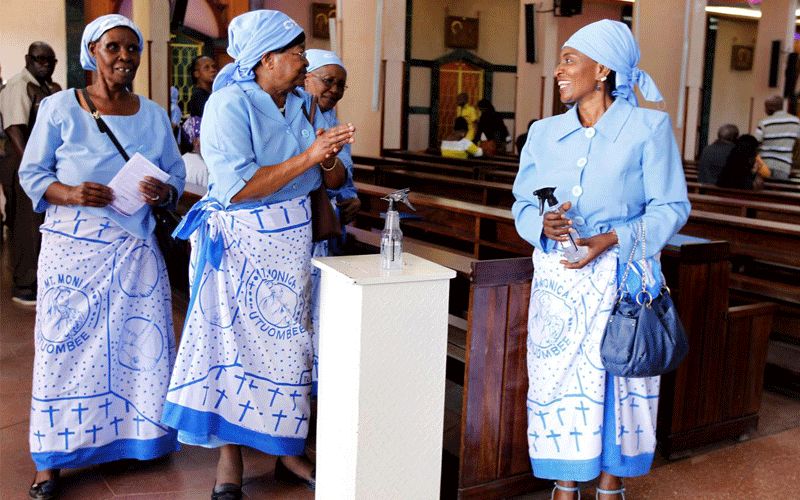Bishop Emmanuel Fianu of the Ho diocese in Ghana has, for instance, issued a directive in a letter to Clergy and lay faithful in his Local Ordinary asking Priests to entirely omit the invitation to the kiss of peace.
The letter by the Divine Word Bishop further noted, “Holy Communion is to be given only under the species of the body and blood of Christ (Bread Only) and concelebrants at the Eucharistic celebrations are advised to consume the precious blood of Christ by instinction.”
The letter added, “All holy water fonts or receptacles in use in the Church are to be emptied and kept dried.”
Bishop Fianu added, “I entreat all parishes and communities to find the most convenient means to educate our faithful on this deadly infection in order to save lives.”
In Sub-Saharan Africa, South Africa seems the most affected on the continent, with the number of confirmed cases having increased from 38 to 51 by Sunday, March 15.
(Story continues below)
Against this backdrop, the leadership of Johannesburg Archdiocese has, in a letter, announced preventive measures.
“Holy Communion will be distributed only in the hand (not on the tongue),” the Archdiocese has directed in the one-page letter and added, “The distribution of the Precious Blood to the faithful should be suspended.”
Further, Priests, deacons and extraordinary ministers of Holy communion have been urged “to practice good hygiene by “washing their hands before Mass begins or even using an alcohol based anti-bacterial solution (hand sanitizer) before and after distributing Holy Communion.”
“The sign of peace should be exchanged without physical contact like hand-shaking; or else the call to exchange a sign of peace should simply be omitted,” reads the letter signed by the Vicar General, Fr. Paul Beukes (OMI) and copied to Local Ordinary, Archbishop Buti Tihagale (OMI) as well as his Auxiliary, Bishop Rishon Duncan Tenka.
The letter also urges the priests to “encourage the Catholic faithful to pray for an end to this challenging situation throughout the world, and pray for those who are afflicted with the coronavirus.”
In the central African nation of Gabon, the Episcopal Conference has invited the clergy, religious and the Catholic faithful to calm and respect the measures adopted in society and in the Church, in the face of the coronavirus.
“We, the Bishops of Gabon, invite the Catholic faithful not to give in to panic, but to turn to the Lord Jesus Christ, the Physician of souls and bodies,” the Prelates stated in their message dated Saturday, March 14.
As safety hygiene measures, the Gabonese Prelates invite the clergy and Christians to “wash your hands frequently with soap or a hydro-alcoholic solution, avoid close contact with people who have a cold or cough, and greeting without shaking hands and avoiding hugs.”
“Those who give communion will wash their hands with soap. Those counting the collection will wear gloves. The meditation of the Way of the Cross remains individual or in family,” the Church Leaders in Gabon state.
They add, “The activities of Groups, Movements and Associations, including Catechism classes and evangelization campaigns, are suspended until further notice.”
In Ivory Coast, the Catholic Bishops' Conference of Ivory Coast (CECCI) has decreed an obligatory fast and prayer for the victims of COVID-19 and the sick in Africa and in the world scheduled for March 20.
In a message signed by its president, Bishop Ignace Béssi, the Ivorian Bishops Conference, further invite all Catholics to “conform to the general hygiene measures taken by the health authorities of the Ivory Coast in all 15 dioceses in the country.
On its part the Bishops’ Conference of Burkina Faso and Niger has called on the whole Church to strictly respect the norms established by the health authorities.
“Burkinabè Catholics are therefore asked to wash their hands regularly with soap or use a hydro-alcoholic solution to rub them, to cover their mouth and nose with the crease of their elbow or with a handkerchief before coughing or sneezing, and to consult a health center in case of fever, cough and breathing difficulties,” the Bishops’ state in their message.
“They should avoid contact with animals and the consumption of raw or undercooked animal products, and avoid close contact with people with coughs and colds, avoid spitting on the ground,” the Prelates advise.
For Cameroon, the Archbishop of Yaounde, Jean Mbarga has also prescribed preventive measures during Holy Mass saying, “From now on, it will be a matter of making sure that there is enough space for everyone during Mass; of omitting the kiss of peace before communion. It will also be necessary to receive communion by intention and to suspend the sprinkling of holy water and the use of the holy water font.”
In the West African country of Senegal, the Bishops, have in a letter, announced the postponement, “until a more favourable date”, the activities of the Catholic community which are "likely to drain many people", as result of the coronavirus.
These include: The World Youth Days (WYD) scheduled for March 29, in Diourbel (centre), diocesan and parish bazaars, and Catholic pilgrimages.
According to the text signed by the Archbishop of Dakar, Benjamin Ndiaye, these measures will take effect from Monday, March 16.
Apart from calling on the faithful to “respect all the hygiene instructions given by the competent services of the Ministry of Health and Social Action of our country for the control of the coronavirus pandemic,” the Senegalese Bishops have also invited the Catholic community to "a special day of fasting and prayer on Friday, March 20.
Jude Atemanke contributed to the writing of this story.
Fr. Don Bosco Onyalla is ACI Africa’s founding Editor-in-Chief. He was formed in the Congregation of the Holy Ghost Fathers (Spiritans), and later incardinated in Rumbek Diocese, South Sudan. He has a PhD in Media Studies from Daystar University in Kenya, and a Master’s degree in Organizational Communication from Marist College, New York, USA.








